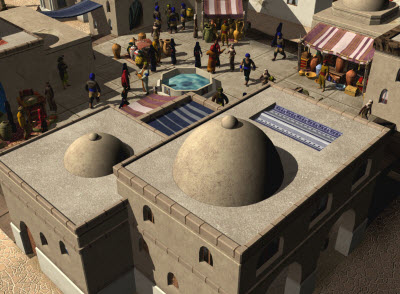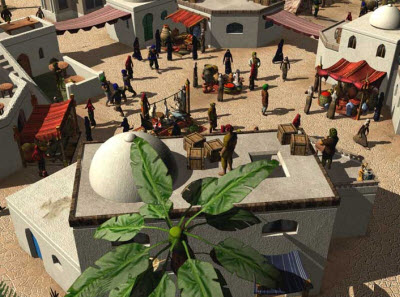 The Middle East has been pretty much off the map when it comes to making video games. But a small Dubai-based start-up called Quirkat would like to change that.
The Middle East has been pretty much off the map when it comes to making video games. But a small Dubai-based start-up called Quirkat would like to change that.
The company’s very existence is a nod to the globalization of the video game business. In a time when web technologies enable start-ups to create, publish and distribute their games anywhere, it’s a lot easier to create games anywhere in the world. So it’s only fitting that an Arab game company should make games for hundreds of millions of people in the Middle East, or people who are interested in games set in the region.
The name “Quirkat” has deep origins as the name of the ancient Middle Eastern game of strategy that may have spawned the game that we know as checkers.
“It traveled around the world from the Middle East into the West and now we’re trying to make the same thing electronically centuries later,” said Mahmoud Ali Khasawneh (pictured below, left), co-founder and chief executive, in an interview at the recent Game Developers Conference, where he spoke on Middle Eastern games at the Localization Summit and attended a gathering of a couple of dozen Middle East game developers.
AI Weekly
The must-read newsletter for AI and Big Data industry written by Khari Johnson, Kyle Wiggers, and Seth Colaner.
Included with VentureBeat Insider and VentureBeat VIP memberships.
While the company’s headquarters is in Dubai, its game studio is in Amman, Jordan, and it has a couple of artists in Beirut.
 He started the company with Candide Kirk (who is half Jordanian, pictured right) in 2004. Khaswaneh was leading the program to get the Jordanian government online and was frustrated with the lack of Arabic language content in the region.
He started the company with Candide Kirk (who is half Jordanian, pictured right) in 2004. Khaswaneh was leading the program to get the Jordanian government online and was frustrated with the lack of Arabic language content in the region.
He and Kirk wanted to create the first Arabic-focused video game development studio that would produce local content. They can take games and “Arabize” them with local content or make original games for the region.
In 2007, they got a big break by being able to co-produce a $5 million game with U.S.-based Breakaway Games. For that two-year effort, they beefed up the team to 40 contractors and co-produced a game called Arabian Lords (pictured top and bottom). That was a disk-based PC strategy game that allows players to become merchant lords during the time of the rise of Islam. The player starts with one palace and expands to rule an entire city during the 7th through the 13th centuries.
“It was tough to learn how to make games, but we had a lucky break,” Kirk said.
Kirk said that shadowing the Breakaway team during the production of the game was invaluable. The game sold about 20,000 copies on the PC. That wasn’t much, but it was the No. 1 game in the region at the time, and Khasawneh said it helped the company get on the path toward its goal of being the No. 1 brand for Arab gamers.
“Breakaway saw that we could do it, and so then on the second game we were able to take on more responsibility,” Khasawneh said.
That game got canceled when the world financial crisis hit in late 2008. But they split on good terms, and Quirkat sped off into its mission of making original games. It created casual game portal Fuzztak for online gaming in Arabic, English and French.
 It has also been working on PC games, Flash games for the web, the iPhone, and Android. It has made four games for Sony’s PlayStation Portable and it is a licensed PlayStation 3 developer (focused on the lighter online PlayStation Network games). Consoles dominate the Middle Eastern market compared to the PC, and the PS 3 is by far the most dominant console because Sony moved into the market first. High piracy rates have hurt the PC.
It has also been working on PC games, Flash games for the web, the iPhone, and Android. It has made four games for Sony’s PlayStation Portable and it is a licensed PlayStation 3 developer (focused on the lighter online PlayStation Network games). Consoles dominate the Middle Eastern market compared to the PC, and the PS 3 is by far the most dominant console because Sony moved into the market first. High piracy rates have hurt the PC.
Historically, the Middle East’s mobile phone market has been about 80 percent Nokia Symbian. Now it is shifting to more BlackBerry and iPhone mobile users, who are still getting accustomed to downloading apps to mobile phones. There is some competition now. There are probably some 20 game studios in the Middle East, including a number in Jordan, Lebanon, Saudi Arabia, and the United Arab Emirates. And there are lots of smaller developer shops across the region as well.
One of the limitations is compliance with Islamic law. The company doesn’t touch on religion or politics for its game topics. Topics such as sex, gambling, alcohol and nudity are banned, and the portrayal of Arabs as the bad guys in games such as Call of Duty Modern Warfare 2 is frowned upon. (Call of Duty games aren’t banned per se and are actually popular.) And within the 22-country region, the standards vary, with strict content standards in Saudi Arabia and looser ones in Egypt and Jordan.
Even with those restrictions in place, that leaves a lot of fun stuff to do, from card games to sports to mythical role-playing games.
“The top ten games in the Middle East will likely mirror the top games in the U.S.,” he said. “Soccer is huge.”
Knowledge of the region is also an advantage, since Quirkat can alert game developers to inaccuracies or sensitivities related to local culture.
Quirkat has done some casual games and Facebook titles as well. Roughly 15 percent of Facebook’s audience originates in the Middle East, and there are 75 million people on the internet in the region, Khasawneh said.
The company has 10 employees and got funding last year. That funding took about six years to raise, but it eventually came from Accelerator Technology Holdings, a fund that focuses on the Middle East.
“We have to raise the value and profile of our company so that it becomes sexier,” Kaswaneh said.
One way it does that is to work on well-known games via outsourcing, and another is to make sure that its art style is distinctive and identifiably Arabic. Kaswaneh said the company is focused on trying to make a PlayStation Network game in the coming year to show what his company can do. (The Xbox 360 doesn’t have much of a base in the Middle East). Kirk says the game will likely focus on casual sports.
Jordan’s universities produce technically savvy graduates for the company to hire, but it usually has to train them in how to make video games. Kirk said that employees have skill, but not experience in dealing with things such as crunch time (finishing a game) or cancellations, which are common.
Because of the focus on Arabic art, the company puts more resources into the artwork and the artists needed to make it. While some engines such as Gamebryo are too expensive, Quirkat can make games with less expensive game-making technologies such as the Unity 3D engine.
So far, all of the revolutions in countries such as Egypt, Libya and Tunisia haven’t led to a disruption in the market yet. The Persian Gulf countries tend to be the more stable ones for game sales.
VentureBeat's mission is to be a digital town square for technical decision-makers to gain knowledge about transformative enterprise technology and transact. Learn More